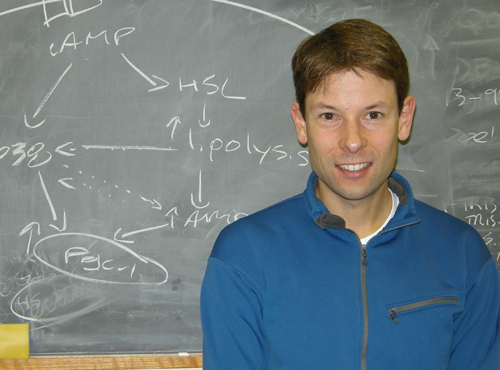
Exercise is good for you. We’ve known that for 50 or 60 years, says U of G professor David Wright, Human Health and Nutritional Sciences (HHNS), but we’re just starting to understand why it’s so beneficial.
Wright has been studying the ways that cells in the body respond or adapt to exercise. His research involves having rats or mice exercise for two hours a day on a treadmill. After a month of this vigorous exercise program, the mice are euthanized and the adipose (or fat) tissues in their bodies are examined to see how the exercise has changed the cells.
The changes, Wright says, are significant. “We measure changes in the mitochondria, enzymes and other components,” he explains. What he’s found is that exercise can mimic the effects of many of the medications given to people with Type 2 Diabetes, without the harmful and potentially dangerous side effects. “Exercise causes the adipose tissues to become more metabolically active. That means the tissue is consuming more energy while at rest. It’s almost switching the characteristics of the cell.”
The effects remain as long as the animal continues to exercise, he adds.
“If we can understand more about how exercise causes these beneficial adaptations,” says Wright, “we can give people more targeted prescriptions for exercise, and we may be able to offer some nutritional approaches as well.”
This is important because, despite the agreement among researchers that exercise and weight management are important in preventing and managing illnesses like Type 2 Diabetes, the rates of obesity and related health problems continue to increase, and the consequences can be serious. Since telling people they should eat less and exercise more clearly isn’t working, Wright says we need other approaches. “For example, there is a compound called resveratrol that is found in the skins of red grapes. It activates the same pathways in adipose tissues that exercise does.”
That’s a prescription that sounds appealing: eat some red grapes or drink a little red wine. Unfortunately, Wright says that you’d need to drink huge amounts of red wine to get the effect of a good workout. “However, purified resveratrol as a food supplement might have beneficial effects,” he points out.
Wright became interested in the ways that the body adapts to exercise when he was an undergraduate student in kinesiology at the University of Calgary. He then went on to earn his master’s at the University of Arizona and his PhD at Ball State University in Indiana. That led him to a four-year post-doc stint at Washington University in St. Louis, where he worked in the School of Medicine.
In 2006, Wright took a faculty position at the University of Alberta. “It had always been my plan to return to Canada,” he says. When his first son was born in 2004, that plan accelerated. Wright and his wife now have two little boys, ages six and three.
While in Alberta, he was doing collaborative work with HHNS professor David Dyck, so Wright was familiar with the program and faculty. That made him eager to apply for the Tier II Canada Research Chair in Lipids, Metabolism and Health when the opportunity became available.
“The big draw for me was that this department is so strong,” he says. “We have the best group of researchers in Canada in this field.”
Wright hopes to continue his research with human subjects, but says this is tricky. “Not all fat is created equal, and the fat cells that respond to exercise are those in abdominal or visceral fat, not the fat under the skin,” he explains. “So we can’t really get samples of that fat from people for our studies. One possibility is to partner with surgeons who might be able to provide us with adipose tissues from people undergoing elective surgery, if the people agreed.” For now, the animal model is easier to study.
Wright takes the lessons of his research into his own life. “The more you exercise, and the more intense the exercise, the better,” he says. “Of course, you have to balance that against all the other demands on you.” Wright runs and bikes frequently, and says he burns off a lot of calories just chasing after his sons. “I do try to do something active every day. If nothing else, it helps to clear my mind.”